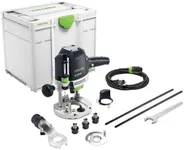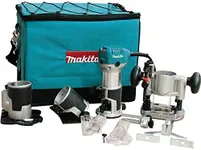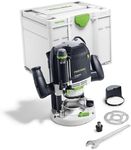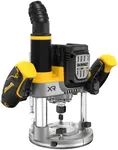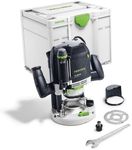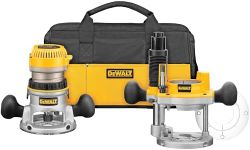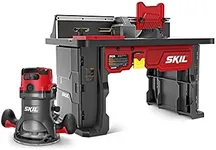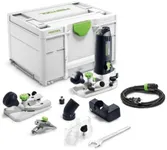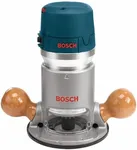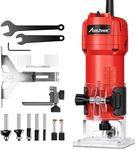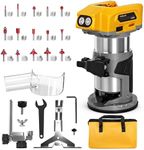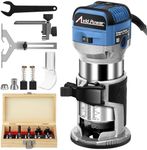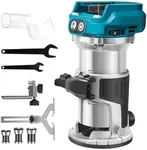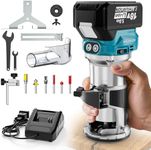Buying Guide for the Best Woodworking Routers
When choosing a woodworking router, it's important to consider the type of projects you'll be working on and the specific needs you have. Woodworking routers are versatile tools that can be used for a variety of tasks such as shaping edges, cutting joints, and hollowing out wood. Understanding the key specifications will help you select the best router for your needs.PowerPower in a woodworking router is measured in horsepower (HP) or amps. This spec is important because it determines how efficiently the router can cut through different types of wood. Routers with lower power (1-1.5 HP or 6-9 amps) are suitable for light-duty tasks and softwoods. Medium power routers (1.5-2.5 HP or 10-12 amps) are versatile and can handle a wider range of tasks and wood types. High power routers (2.5+ HP or 13+ amps) are best for heavy-duty tasks and hardwoods. Choose a power level based on the type of projects you plan to undertake.
Speed ControlSpeed control refers to the ability to adjust the router's RPM (revolutions per minute). This is important because different materials and bit sizes require different speeds for optimal performance and safety. Fixed-speed routers operate at a single speed, which is suitable for consistent tasks. Variable-speed routers allow you to adjust the speed, making them more versatile for different materials and bit sizes. If you plan to work with a variety of materials or perform intricate tasks, a variable-speed router is a better choice.
Collet SizeThe collet size determines the size of the router bits you can use. Common sizes are 1/4 inch and 1/2 inch. This spec is important because it affects the range of bits available to you and the stability of the bit during operation. 1/4 inch collets are suitable for light-duty tasks and smaller bits, while 1/2 inch collets provide better stability and are suitable for heavy-duty tasks and larger bits. If you need versatility and plan to use a variety of bit sizes, look for a router that supports both collet sizes.
Base TypeWoodworking routers come with different base types: fixed base, plunge base, and interchangeable base. The base type affects how you can use the router. Fixed base routers are stable and precise, making them ideal for edge work and simple tasks. Plunge base routers allow you to start cutting in the middle of a workpiece, which is useful for more complex tasks like inlays and mortises. Interchangeable base routers offer the flexibility of both fixed and plunge bases. Choose a base type based on the complexity and variety of your projects.
ErgonomicsErgonomics refers to how comfortable and easy the router is to handle. This is important because woodworking can be a time-consuming task, and a comfortable router reduces fatigue and increases precision. Look for features like comfortable grips, balanced weight, and easy-to-reach controls. If you plan to use the router for extended periods, prioritize ergonomics to ensure a more enjoyable and efficient working experience.
Dust CollectionDust collection is a feature that helps manage the sawdust and debris produced during routing. This is important for maintaining a clean work environment and for your health. Routers with built-in dust collection ports can be connected to a vacuum system to minimize dust. If you work in a small or enclosed space, or if you want to keep your workspace clean, look for a router with effective dust collection capabilities.
